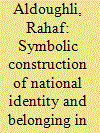| Srl | Item |
| 1 |
ID:
184471


|
|
|
|
|
| Summary/Abstract |
Despite the official secularity of the Syrian state, religion has always been a viable instrument used by the Baˈathist regime to consolidate its authority and legitimacy. Taking different historical trajectories ranging from confrontation to co-optation, the boundaries between state and religion have shifted to conflation in the post-2011 uprising. The official political rhetoric has become explicitly religious and anti-secular, ending an era of official secularity since the 1970s. This newly employed religious rhetoric is evident in the presidential discourse, which is heavily and explicitly infused with religious language. Analysis of Bashar al-Assad’s speech to high-ranking ulama in 2011 and his other public statements on the website of the Ministry of Awqaf provides evidence not only of how such religious language marks the move from secularity, which was used to strategically co-opt religious institutions up to 2010, but also how the deployment of religion has become a source of security, legitimacy and survival for the Baˈathist regime since 2011.
|
|
|
|
|
|
|
|
|
|
|
|
|
|
|
|
| 2 |
ID:
169284


|
|
|
|
|
| Summary/Abstract |
This article investigates the relationship between the construction of masculinist national identity and the perpetuation of nationalist songs after the ascendance of the Syrian Bàth regime. Popular in schools and Bàth-affiliated organisations, and performed on national holidays and festivals, nationalist songs are an important component of Syrian oral culture. They are premeditated to construct a particular perception of national belonging and identity. Covering two different periods (the 1973 war to1990 and 1990–2007), the article examines the ways these songs construct the nation around the normalisation of sacrificial death and argues that, through the perpetuation of masculinist values as key characteristics of national belonging and identity, these songs obscure women’s status in Syrian political culture and contribute to their subordination.
|
|
|
|
|
|
|
|
|
|
|
|
|
|
|
|